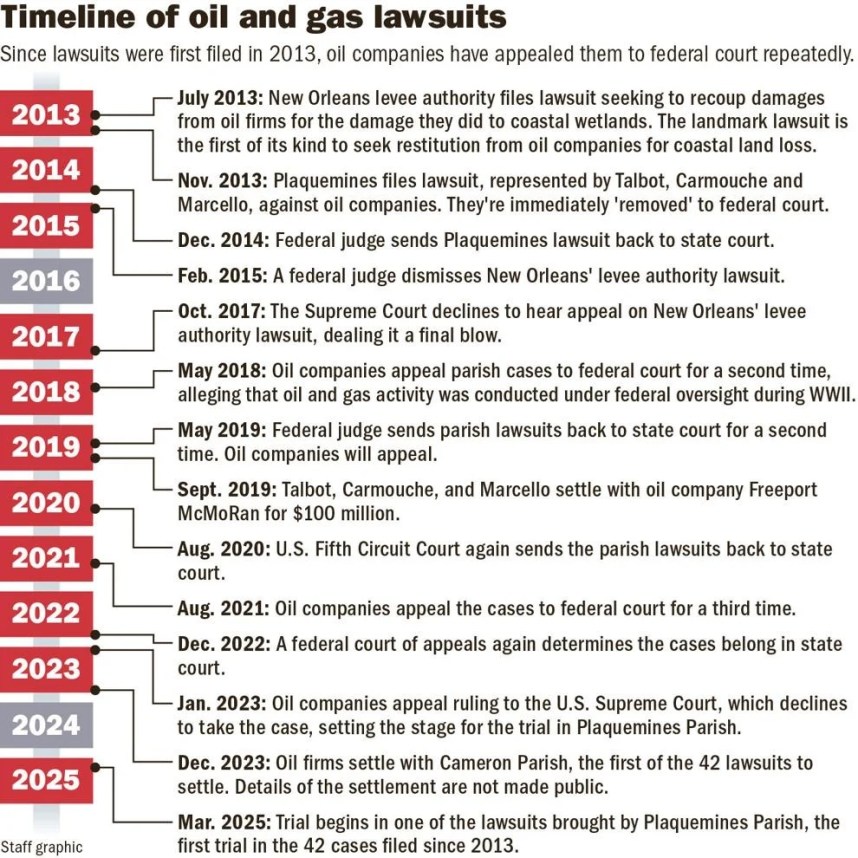The Trump administration is siding with Chevron at the U.S. Supreme Court in a closely watched case related to Louisiana’s coastal lawsuits and whether they should be heard in state or federal court.
In a brief filed with the court last week, U.S. Solicitor General John Sauer agreed with Chevron, which was recently ordered by a Plaquemines Parish jury to pay $745 million to restore state wetlands, that it should be allowed to fight that case and others in federal court, which is seen as a potentially friendlier venue for the oil giant.
The company has argued that federal court is the correct venue for cases of this type because they involve oil and gas production that was part of a federally sanctioned effort during World War II to make aviation fuel. Chevron and the companies it bought “worked for the federal government to refine aviation gasoline — a vital wartime product that powered Allied air forces to victory,” Sauer argued in the brief.
Plaquemines Parish, which sued the companies, has argued successfully in lower courts that the oil in question was not directly linked to wartime production and therefore the case should remain in state court.
A long legal saga
The case before the Supreme Court relates to one of more than 40 similar lawsuits across south Louisiana, all spearheaded by Baton Rouge attorney John Carmouche of the law firm Talbot, Carmouche and Marcello, that seek damages from oil companies for coastal restoration.

The first of the cases was filed in 2013. Though the legal saga stretches back more than a decade, the new filing means that Gov. Jeff Landry and Louisiana Attorney General Liz Murrill are now on the opposite side of the case from the Trump administration.
Landry’s administration argued the case in Plaquemines alongside the parish and Carmouche, and Murrill has been outspoken in support of the litigation.
Murrill said Monday she is standing behind the lawsuits.
“When the Supreme Court gets past the smoke and mirrors, it will see there’s no federal contractor connection,” Murrill said. “But as I’ve said before, it won’t matter whether we are in state or federal court for this small group of lawsuits. The jurors are the same people.”
The U.S. Department of Justice filed a friend of the court filing, meaning that while it is not a party to the lawsuit, it claims a significant interest in its outcome.
Since the cases were filed, oil companies have tried three times to remove the cases to federal court. That effort has so far been unsuccessful. In 2022, a split three-judge panel at the Fifth Circuit Court of Appeals sent the case back to state court and it moved forward to trial.
Carmouche, working for Plaquemines Parish, won the case in April after a month-long trial, successfully convincing a jury that the company did not properly clean up after it ceased oil production.
But before the trial started, Chevron had appealed the 5th Circuit’s ruling that the case belonged in state court, and the Supreme Court agreed to hear that appeal.

Chevron attorneys pose in front of the Old Plaquemines Parish Courthouse in Pointe ˆ la Hache, La., Friday, April 4, 2025.
The Supreme Court is expected to hear the case in the fall. If it were to rule in favor of Chevron, some or all of the 40 cases in Louisiana could move from state to federal court.
Vic Marcello, a lawyer on Carmouche’s legal team, said that a federal judge could vacate the Plaquemines verdict if the Supreme Court sends that case to federal court.
Other Republicans side with Chevron
Republican attorneys general from seven states, led by West Virginia Attorney General JB McCuskey, filed briefs arguing that the cases belong in federal rather than state court.
So did the U.S. Chamber of Commerce, the Louisiana-based free-market think tank The Pelican Institute, and six Republican Senators, led by U.S. Sen. Mike Lee, R-Utah.
The lawmakers argued in their brief that “a party acting on behalf of the federal government should not have to litigate claims in potentially hostile venues” referring to the local Louisiana parishes where the cases were filed.

Source